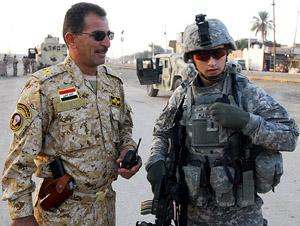US troop withdrawal and stability in Iraq
Iraqi and US soldiers on joint patrol south of Baghdad. (Image: flickr user DVIDSHUB (cc:by-nd))
The following is not a full transcript; for full story, listen to audio.
Four U.S. soldiers died last night in Baghdad, following a series of bombing last week that killed nearly 160 people. Despite Iraqi President Nouri al-Maliki’s insistence that Iraqi security forces are up to the challenge, many believe that Iraq’s urban areas may destabilize without U.S. support.
On "The Takeaway" to discuss the US troop pullout are Nazar Janabi, former Director General for defense policy in the Iraqi Ministry of Defense; and Professor Gary Solis, a retired U.S. Marine with 26 years experience who teaches military law at Georgetown University, and who also formerly taught at West Point.
Janabi explains the celebration by the people of Iraq: "It’s very understandable that Iraqis feel very jubilant today because they have regained … their control over their country. It has been several years now — since the beginning of the invasion in 2003 — and Iraqis have felt that they did not have any control over their fate. And incrementally they have increased their control over their destiny, and since [President] Maliki’s government took over, we have noticed that trend of … how Iraqis are independent, how the Iraq decision is for Iraqis only … this was not something that could not even be discussed two years ago. Iraqis did not have the power or the confidence in their capabilities to discuss this with the Americans, and now … Iraqis feel that they have taken control over the fate of their country."
The mission for Iraqi security forces is to take over for the Americans and keep the levels of violence at minimum, says Janabi: "Although everyone is celebrating, everyone also is … being extremely careful of what is going to happen next. How are the terrorist, how are the extremist groups going to react to the withdrawal of American forces?"
Solis describes the mission for the US at this point: "I think it’s a unique mission — any time you have a counterinsurgency, the population is the prize, the objective. And so as Mr. Janabi indicated, security is the primary mission. So American forces are in effect, I believe, going to prove to be the 911 force for Iraqi security forces — if they get into a firefight, or a situation in which they can’t control the outcome, they’re going to call for American reinforcements and air support. So, our mission is to provide backup, to provide additional firepower to the Iraqi forces, whose mission is to provide security for the population."
Both Solis and Janabi believe that violence will flare up in Iraq in the short term after the withdrawal.
Solis: "We’re already seeing it of course, a spike in the bombings, a spike in the deaths — four US [killed in action] last night — so I think it’s inevitable that we’re going to see an increase in violence. But much of it is not effective — it’s for the press primarily. The question is: will we approach some tipping point in which violence flares in which the Iraqi populace looks to sectarian forces to provide security. If that happens, we can be in very serious trouble.
"Both sides have such a grave stake in the success of the Iraqi forces in providing security that we’re going to do everything we can to help the Iraqis. And I think we will find that US forces aren’t entirely out of the picture as much as the newspapers may be indicating right now."
Janabi: "There will definitely be attempts from extremist groups to flare up the violence. The question is, how capable are Iraqi forces to respond to these? The Iraqi forces lack some of the … logistical support, the intelligence … I’m hopeful that after the Americans have moved out of the cities, they have passed on this information to the Iraqis so they could follow up on the intelligence on the neighborhoods that were occupied by the Americans."
Solis explains the rules of engagement for Iraqi security and US forces moving forward: "There has to be a level of conflict which is … very high before Americans get involved. Because … the political imperative is now playing as much a role as the combat imperative and there has to be a delicate balance between the two. And I think we’re going to have to see that worked out on the ground … and so this is something that over the coming weeks and probably the coming months, we’re going to see mistakes made, a few mistakes; a few failures."
"The Takeaway" is a national morning news program, delivering the news and analysis you need to catch up, start your day, and prepare for what’s ahead. The show is a co-production of WNYC and PRI, in editorial collaboration with the BBC, The New York Times Radio, and WGBH.
